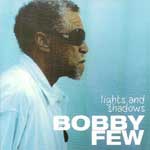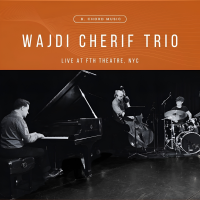Home » Jazz Articles » Interview » Larry McKenna: Keeping the Legacy Alive
Larry McKenna: Keeping the Legacy Alive
LM: Yeah, they all refer to the Kind of Blue (Columbia, 1959) album as modal, but only one or two of the tunes are modal.
CS: "Blue in Green" is not modal. "So What?" is modal.
LM: But you could say "So What?" is just based on a D minor 7th chord. And you could go back to standards like "Dearly Beloved" and find the same pattern in the whole eight bars. So I don't know why they thought it was so new. And on that album, if you listen to Cannonball Adderley, he was just doing his own way of playing bebop. The fellows who have done research on that album tell us that the players never intended it to be anything revolutionary—it was just a record date. Actually two sessions a few months apart.
AAJ: Well, perhaps Miles Davis himself did have something special in mind. In any event, the most innovative music really contains everything that came before it. That's part of what makes jazz so fascinating—you can hear elements going back to Africa or the Southern plantations in the most modern jazz.
The Personal Side
AAJ: But let's talk about you as a person, Larry. When I go to a club like Chris' and you're playing, I think to myself, "This guy McKenna, he's a "mystery man.' He sits there rather anonymously in a business suit, doesn't make small talk, and just plays his axe. Who is this guy?" So who are you? For example, you mentioned your wife earlier. I had no idea whether or not you were married.LM: My wife passed away almost seven years ago. I was married for thirty-four years. She was ill with breast cancer for a long time. She got cancer in 1977 and died in 2000. For twenty-three years she fought that disease, with some periods of remission.
AAJ: That must have been a very difficult time for both of you. Do you have any children?
LM: My wife had two daughters prior to our marriage. Then we had a son. One of her daughters was killed in a car crash twenty years ago. The other girl still lives with me. Tomorrow's her birthday. My son lives in Los Angeles. He's a singer/songwriter and plays the guitar—not jazz.
AAJ: Did your wife love music?
LM: Yes. She would come to hear me when she could, given her medical condition. She was a real survivor—she lived much longer than any of the doctors expected. But the chemo often knocked her out of commission. And she actually died from a chemotherapy related stroke rather than the cancer itself.
AAJ: Now, these days, do you have any interests other than music?
LM: No, I really don't. Occasionally, I'll watch a ball game on TV or read a book or whatever. It's kinda crazy, but I'm always having tunes running through my head all the time. Sometimes I think I'm like an idiot savant—I only think of tunes! Sometimes I have trouble going to sleep.
AAJ: It's like the musical brain can't stop. I've heard that from other musicians. As you mentioned, Tom Lawton is a good friend of mine. Even when he's having a conversation, his fingers are always going with piano music. He's hearing music constantly.
LM: The other night, some tune started in my head, and I was thinking of every possible way to play it, and I tried to stop myself, but I couldn't! [Laughter]
AAJ: I like to get musicians' personal takes on spirituality. Coltrane once said that music was an expression of his spirituality. Do you have a spiritual philosophy? Sonny Rollins, for instance, studied meditation in India. Do you ever think about that sort of thing?
LM: No, I'm not that heavy. But the one thing I have always believed is that music comes from God.
AAJ: That's pretty deep!
LM: Well, but when I play, I'm not consciously trying to convey something spiritual. It's just music— funny, pretty, whatever. I was just telling someone that a lot of the new guys don't have a sense of humor in their playing. Dizzy and Bird and those guys did a lot of playing that had to do with humor and romance. Nowadays, you can't be sentimental. If you want to call all that stuff spiritual, that's the way I see it. But I do think that God creates the music.
AAJ: I would say that comes through when you play. And I do think humor is a big part of spirituality. The music of Mozart, Beethoven, even Gustav Mahler, contains elements of humor. And I do think there is a trend not only in jazz but in society in general today to be ultra-serious, take oneself too seriously. We've lost some of the lightness and romanticism.
So, to round off our discussion, what do you plan to do next? Are you a "day at a time" guy, or do you have some plans? Would you like to compose?
LM: My composing is more in the form of arranging. I play with a big band, the Clef Club Jazz Band. I write some arrangements for them. I do it all rather spontaneously—I don't plan it out in advance.
AAJ: So what's next?
LM: I'm working on doing another CD as a leader. If I get a producer, we'll go with that and figure out the tunes, and so on. I can't disclose too much right now because we're having some talks with a producer.
AAJ: So how would you sum it all up, Larry?
LM: Well, I remember a story Sammy Nestico once told me. Billy Byers hired him to do some arranging with a team he needed for a production. Byers knocked off ten pages of arranging for every one that Barry could do. At first, Sammy felt devastated—here's a guy ten times as good as him. But then he realized each person is unique. If you do your personal best, you're a success. That's what I think aspiring musicians should keep in mind. Like, I might never be a Coltrane, but whatever I do I try to do it well. And I've gotten to where I have a distinct style and people appreciate my music. I couldn't ask for more than that.
Selected Discography
Frank Tiberi, 4 Brothers 7 (Jazzed, 2007)Craig Raymond and the Next Generation Big Jazz Band, Straight Ahead (Star Satellite, 2006)
John Swana and the Philadelphians, Philly Gumbo, Vol. 2 (Criss Cross, 2005)
Robert Henderson, RH Positive (Philly Breakdown, 2002)
Larry McKenna, It Might as Well Be Spring (Dreambox Media, 2001)
City Rhythm Orchestra, Goin' to Town (Limehouse, 2000)
Larry McKenna, My Shining Hour: Larry McKenna Plays Harold Arlen (EPE, 1996)
Woody Herman and His Thundering Herd, Crown Royal (Laserlight, 1992)
Buddy DeFranco, Born to Swing (Hindsight, 1988)
Tags
PREVIOUS / NEXT
Support All About Jazz
 All About Jazz has been a pillar of jazz since 1995, championing it as an art form and, more importantly, supporting the musicians who make it. Our enduring commitment has made "AAJ" one of the most culturally important websites of its kind, read by hundreds of thousands of fans, musicians and industry figures every month.
All About Jazz has been a pillar of jazz since 1995, championing it as an art form and, more importantly, supporting the musicians who make it. Our enduring commitment has made "AAJ" one of the most culturally important websites of its kind, read by hundreds of thousands of fans, musicians and industry figures every month.























